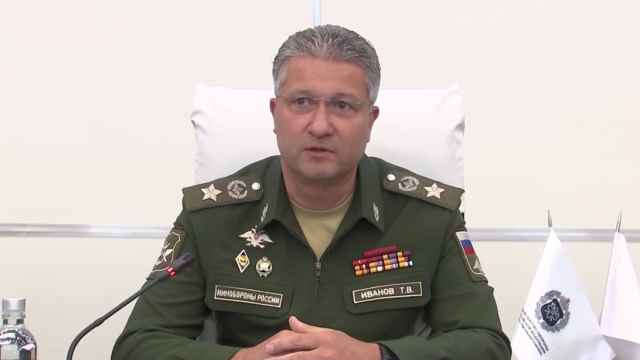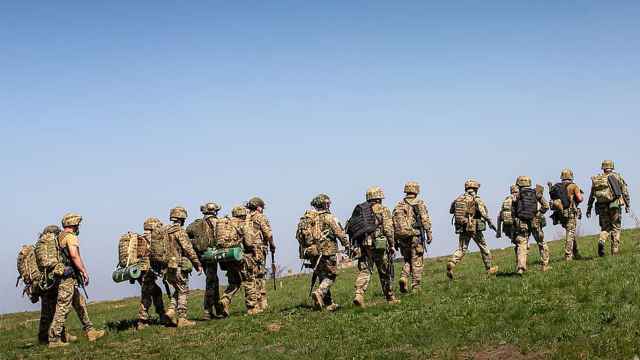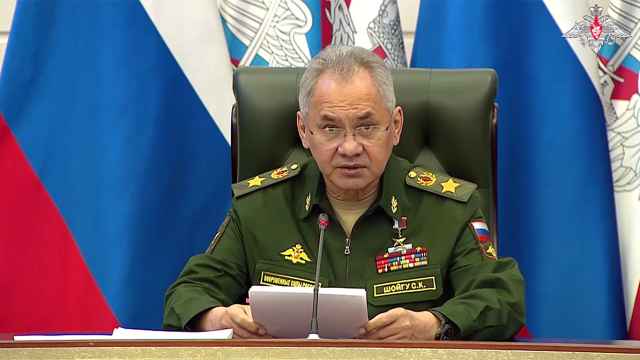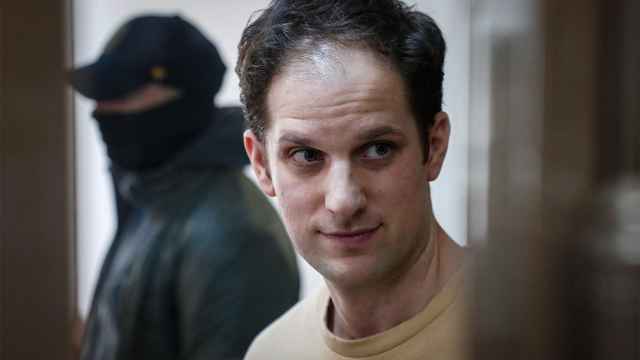A top doctor implored foreigners not to be scared off by the thick smog that has blanketed Moscow for the past three days, even as embassies evacuated staff and at least one closed altogether.
The smog, caused by fires in peat bogs and forests in the Moscow region amid a record heat wave, will not lift before Wednesday at the earliest, weather forecasters said.
The level of air pollution Sunday hovered around three times above the maximum acceptable level after peaking at more than six times above the acceptable level Saturday, the worst day on record this year, the city's environmental monitoring service said.
In a possible indication that the air quality might worsen, the total area covered by fires in the Moscow region tripled from 65 hectares Friday to 210 hectares Sunday, the Emergency Situations Ministry said.
Mayor Yury Luzhkov cut short a vacation to return to Moscow after initially insisting that there was no crisis.
Gennady Onishchenko, the country's top public doctor, said the smog could pose a health risk for those without facemasks but asserted that it was not a reason for foreigners to avoid Russia.
"An overwhelming part of Russian territory does not pose any danger and is not engulfed in smoke," he said Friday.
He advised business travelers to stay indoors, saying, "If a businessman visiting Moscow stays in a hotel, or an office, or a car, it is safe," Interfax reported.
"As for tourists, some adjustments could be made. For instance, visit first St. Petersburg, where everything is fine, and then Moscow, when the situation improves," he said.
But the smog reached St. Petersburg on Sunday, news reports said.
In Moscow, the German Embassy announced that it was halting operations, while Austria, Canada, the Czech Republic, Israel and Poland have ordered the partial evacuation of their diplomats, Ekho Moskvy radio reported Saturday, without elaborating on whether the staff were being sent home or simply away from the city.
The United States and Italy advised citizens to think twice before visiting Moscow.
"Persons contemplating travel to Moscow and surrounding areas should carefully consider their plans" because of "hazardous levels of air pollution" that have caused "numerous flight delays and cancellations," the U.S. State Department said Friday in a statement on its web site. The warning expires Sept. 5.
Italy’s Foreign Ministry advised citizens to “postpone any travel plans that aren’t strictly necessary,” Bloomberg reported.
After dozens of flight delays Friday and Saturday, about 40 flights were delayed at Moscow's Domodedovo Airport on Sunday and about 20 more at Vnukovo. Sheremetyevo Airport said it was operating without smog-related delays.
About 2,000 stranded passengers spent Saturday night at Domodedovo, while at Vnukovo, several children were hospitalized after spending hours in the smog-filled departure hall.
But leaving Moscow still looked like a better prospect than staying for some people. One travel agency said Saturday that its number of clients had doubled, RIA-Novosti reported.
For those who choose to stay in Moscow, the best protection against the smog is facemasks, said Onishchenko, who heads the Federal Consumer Protection Service.
“We demand and beg you to wear masks. A mask really stops pollutants, especially if it's moistened,” Onishchenko said.
Some Moscow residents complained about not being able to find masks in drug stores, but the Russian Drugstore Union, which represents more than 3,000 stores nationwide, denied any shortage, saying some stores might have sold out before they managed to restock.
Some companies were handing out masks to their employees, and the supermarket chain Perekryostok was offering them free to customers.
Even the Butyrskaya pretrial prison was providing detainees with facemasks and fans on request, Interfax reported Sunday.
Germany promised to send 100,000 masks to Russia on Saturday.
An ambulance station presented President Dmitry Medvedev with 50 masks when he asked for advice on how to cope with the smog during a visit Friday.
Medical staff told Medvedev that the masks were the second best option — after leaving the city altogether. Other recommendations included avoiding direct sunlight, refraining from alcohol and drinking lots of liquids.
"I woke up this morning and looked around — it's an abysmal situation," Medvedev said. "Have patience because I hope this will all end."
Medvedev left the city over the weekend for a visit to Georgia's breakaway region of Abkhazia.
Meanwhile, the number of deaths in Moscow has tripled, with morgues admitting up to 30 bodies a day instead of the regular 10, RIA-Novosti reported Thursday, citing unidentified sources in the funeral industry.
Some burials had to be delayed because gravediggers were swamped with work, the report said.
The head of the Moscow branch of the Federal Consumer Protection Service, Tatyana Popova, confirmed on Friday that the number of deaths had increased, mainly because of people succumbing to lung and heart problems, but she refused to provide exact data.
“I will not announce the figures now to avoid fanning tensions,” she said, Interfax reported. "Later we will prepare the data on how much the mortality rate has increased because of the heat and other climate conditions."
A blogger who identified herself only as Mamako, a Moscow doctor, wrote on her LiveJournal blog on Saturday that doctors were unofficially banned from diagnosing people with heatstroke.
But the blog was deleted Sunday, shortly after an unidentified emergency doctor denied any ban in an interview with Ekho Moskvy.
The Liberal Democratic Party called for a state of emergency to be declared in Moscow, saying in a statement that the city was "unbearable for living" and all factories should halt work in order to curb pollution.
Luzhkov, who left Moscow on Aug. 2, agreed to return Sunday because of "the developing situation in the city due to fires," his spokesman Sergei Tsoi said, Interfax reported. He added that the mayor had been away to undergo treatment from an unspecified “sports injury.”
Tsoi did not mention the injury Friday, when he said Luzhkov did not intend to interrupt his vacation because there was no crisis in Moscow and city authorities were not responsible for fighting the smog, Lifenews.ru reported.
Luzhkov is a long-time proponent of fighting rain by dispatching jets to spread chemicals over unwanted clouds, but it turns out that the reverse is beyond his abilities. Creating artificial rain is currently impossible because there is not enough moisture in the air, climate experts told The Associated Press.
In a first, the Russian Premier League canceled two Sunday football games in the Moscow region because of air pollution, and an exhibition game between Russia and Bulgaria, scheduled for Wednesday, had to be relocated to St. Petersburg.
The State Historical Museum and the Moscow Museum of Modern Art had to close early over the weekend because the smog was setting off fire detectors, while parts of the Pushkin Museum were closed off because they lacked proper air conditioning.
City authorities on Sunday opened 123 air-conditioned "anti-smog centers" to the public in government buildings and hospitals to allow people to "get their breath back," AP reported.






